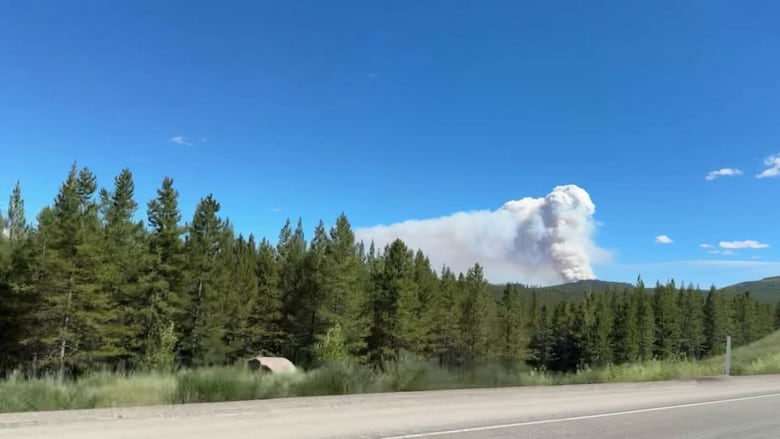Wildfire near Princeton, B.C., prompts evacuation order for dozens of properties
Evacuation order covers 30 properties as crews monitor another growing fire south of Princeton

An out-of-control wildfire just east of Princeton, B.C. has forced dozens of residents to flee their homes and put dozens of others on evacuation alert, as fire crews continue to fight the blaze.
The August Lake wildfire, burning about 2.3 kilometres east of Princeton's town centre, was reported Saturday afternoon. B.C. Wildfire Service said it is 0.14 square kilometres in size.
Princeton Mayor Spencer Coyne, who witnessed the fire's growth from the beginning, said the blaze was about the size of a car when it started around 2 p.m. on Saturday.

"It just grew from there, and the wind sustained it," Coyne said, adding the wildfire "doubled in size" within about 20 minutes.
He said the evacuation order is in place for 30 properties, while about 40 homes are on evacuation alert — including his own.
The Regional District of Okanagan-Similkameen (RDOS), which issued the evacuation orders, says they also apply to nearby campsites and the Princeton Golf Club, as well as its on-site restaurant. The properties under alert include a mix of residential and agricultural.
Under the evacuation order, residents must leave immediately and register at the emergency reception centre now located at the Princeton Annex at 231 Bridge Street — a change from from the previously designated Princeton Arena.

B.C. Wildfire Service says the fire is suspected to be human-caused and is burning in an interface zone, meaning it poses a direct threat to homes and infrastructure.
"As we get more into the hotter points of the day, they are expected to see a bit of an increase in behaviour," Cassidy Martin, fire information officer with the Kamloops Fire Centre, told CBC News on Sunday.
She says the August Lake wildfire is exhibiting Rank 1 to 2 behaviour, meaning flames are visible on the surface but are spreading slowly.
According to the wildfire service, about 40 firefighters and three helicopters are on scene to contain the blaze.
The Regional District of Okanagan-Similkameen has issued an <a href="https://twitter.com/hashtag/Evacuation?src=hash&ref_src=twsrc%5Etfw">#Evacuation</a> Order in Electoral Area H near August Lake incl. the Princeton Golf Club due to <a href="https://twitter.com/hashtag/BCWildfire?src=hash&ref_src=twsrc%5Etfw">#BCWildfire</a>. This wildfire is a threat to safety. Impacted residents must evacuate now. More info: <a href="https://t.co/YoaydMEZv5">https://t.co/YoaydMEZv5</a> <a href="https://twitter.com/hashtag/BC?src=hash&ref_src=twsrc%5Etfw">#BC</a> <a href="https://t.co/fggyCD6EyL">https://t.co/fggyCD6EyL</a> <a href="https://t.co/oxJ50PTIMJ">pic.twitter.com/oxJ50PTIMJ</a>
—@EmergencyInfoBCCoyne said the town is "no stranger to fires and emergencies," and he has heard from the fire chief that the threat to the houses has been downgraded.
Another wildfire burning south of Princeton
Meanwhile, fire officials are also tracking the nearby Placer Creek wildfire south of Princeton, which saw significant growth on Sunday.
The fire, also believed to be human-caused, expanded from 2.91 square kilometres in the morning to 7.25 square kilometres, according to B.C. Wildfire Service. It is burning near Eastgate, a small cabin community located 45 minutes southwest of Princeton.

BCWS says 23 firefighting personnel and one helicopter are responding to the Placer Creek wildfire, which was exhibiting Rank 5 fire behaviour Sunday evening, which means extremely vigorous surface fire activity.
Smoke is highly visible from the surrounding areas and from Highway 3.
The wildfire service said it anticipates there will be more aggressive fires burning across the southern Interior due to the hot and dry weather conditions over the weekend with "widespread potential" for thunderstorms across the province on Sunday.
"The heat can remain underground for several days, or even weeks. Then as the weather dries out and heats up, they (the fires) can flare up to become full-fledged wildfires," the service said.
The wildfire service said about 80 per cent of the active fires are lightning-caused, while 18 per cent are human-caused.
With files from Akshay Kulkarni and The Canadian Press

